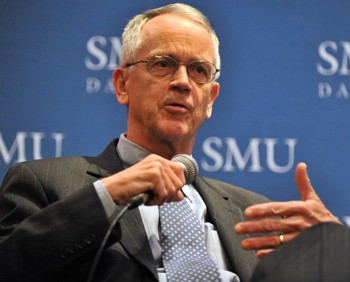
Charles M. Vest, president of the National Academy of Engineering, spoke at the Turner Construction Student Forum on Tuesday afternoon. (Stuart Palley)
Science and math education are vital to U.S. world competitiveness and maintaining our economic standard of living, say Ralph Cicerone, Harvey Fineberg and Charles Vest.
Ralph Cicerone is the president of the National Academy of Sciences and is a leading expert on atmospheric climate change. Harvey Fineberg is president of the Institute of Medicine and is an expert in fields ranging from AIDS prevention to medical education. Charles Vest is president of the National Academy of Engineering and is the former president of the Massachusetts Institute of Technology.
In discussing their recent report, “Rising Above the Gathering Storm,” at the Tate Lecture on Tuesday, Vest described a hidden problem facing the United States.
“This nation has a lot of literal enemies, but the enemy that I fear the most is our own complacency,” he said.
Vest discussed how the U.S. has become complacent in factors that contribute to our world dominance and economic vibrancy. He cites that much of our economic power comes from the innovations for which the U.S. has become known in its history. He fears these surging innovations are dwindling and allowing the rest of the world to catch up and pass the U.S. as world leaders in science and innovation.
“There is indeed a gathering storm of other nations who are getting stronger, who are getting more advanced in their education, who are beginning to drive departmental areas of math and science often much more progressively and passionately than we seem to be because we have become complacent,” Vest said.
Vest and the other panelists believe the root of our “complacency” begins with primary and secondary schooling. Vest believes this is where the U.S. is stagnant and the rest of the world is surging.
“Many programs and funding have been devoted to education in this nation, but seeming somewhat for waste, as the simple fact is, we are falling behind most of the rest of the world,” Vest said.
Vest cited that the U.S. is 16th in OECD countries in populace access to the Internet, 17th in percentage of population graduating high school, 14th in the number of college graduates earning degrees in science and 22nd in the world in non-defense spending on research and development.
In the report they published “Rising above the Gathering Storm,” the academy heads and their departments cited possible solutions ranging from more funding and resources devoted to K-12 science and math programs, giving incentives for the best and the brightest students nation and world wide to study at U.S.
universities, and more governmental assistance for research and development.
Without this, the panel felt that the U.S. would continue to fall behind the rest of the surging math and science programs in other nations in the world.
“This is a huge problem facing this nation, much larger than any current economic turbulence this nation is facing, if not addressed properly and promptly, we can expect out children to have a lower standard of living than we do,” Fineberg said about the effects of continued complacency.








